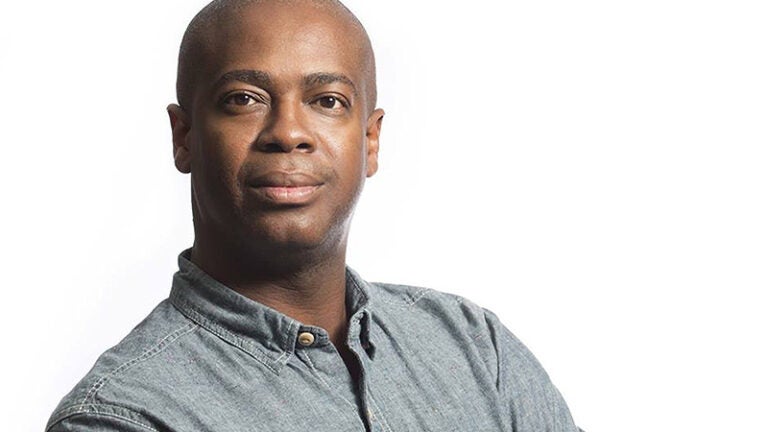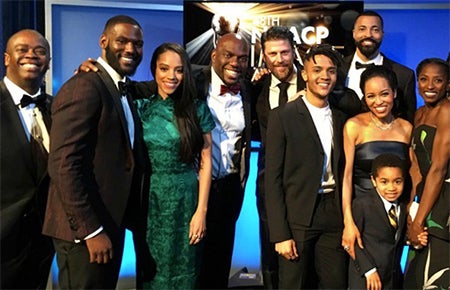
Profile: Reaching for the Stars
As a skinny kid growing up in a working-class family on Chicago’s South Side, the closest Anthony Sparks ever got to television star and media magnate Oprah Winfrey was glimpsing her multimedia production company, Harpo Studios, through the grimy window of the bus he rode home from school.
For Sparks, who earned a BFA from USC School of Dramatic Arts in 1994 and an M.A. and Ph.D. in American studies and ethnicity from USC Dornsife in 2009 and 2012, rubbing shoulders with stars is now a frequent occurrence.
Talent, education, ambition and hard work have propelled him from his humble roots to a glittering career as an award-winning television writer, producer, Broadway actor and respected academic.
Sparks is a writer and the co-executive producer on Queen Sugar, Winfrey’s acclaimed project with director Ava DuVernay. Earlier this year, he was nominated for an NAACP Image Award for Outstanding Writing in a Dramatic Series for his work on the show, which airs on Winfrey’s OWN network.
When he isn’t filming Queen Sugar in New Orleans or working on other television dramas, the former Broadway actor (he also starred in the hit musical STOMP for six years) is teaching at California State University, Fullerton, where he is a professor in the Department of Cinema and Television Studies.
How did Sparks get here? And equally fascinating, how does he juggle it all?
Humble beginnings
Sparks was the first in his family to be born outside Mississippi. His mother, Pearl, left school after sixth grade to work as a sharecropper and domestic servant before moving to Chicago in 1968. There, on her own, she raised Sparks, who discovered an early love of language and performing while at church.
“We used to do Easter and Christmas plays and speeches for Mother’s Day,” he said. “I loved it. I’d ask if I could recite poems in church.”
Sparks attended neighborhood schools until testing as a gifted student in seventh grade earned him a place at former First Lady Michelle Obama’s alma mater, Whitney Young Magnet High School. He immersed himself in theatre and dance, winning numerous honors, including two golds for writing and speech oratory and a silver for acting in the NAACP’s prestigious ACT-SO national awards.

Anthony Sparks (far left) and the Queen Sugar team celebrate backstage at the 38th Annual NAACP Image Awards in February 2017. Photo courtesy of Anthony Sparks.
After receiving offers from the nation’s top drama schools, Sparks chose the BFA program at USC, drawn by the program’s reputation and his mother’s wise counsel.
Sparks credits his mother as a major inspiration. “She always had a larger vision for her children — and for me especially — than she was given the opportunity to live,” he said of Pearl, who passed away in May.
“My mom had drilled into me that I should see college as an adventure, an opportunity to move away from home and learn how to grow up. It felt like if I went to USC my horizons would be blown open.”
His classmates viewed him as a driven actor. “What they didn’t know is that privately I was electrified by the literature and criticism I was being exposed to at USC,” Sparks said. The result? He started to write again.
“I felt if I had a talent, I was supposed to do something with it. I was never an actor who thought that academics weren’t important. As an African-American artist, I knew that opportunities would be different for me, so I wanted to be prepared for that.”
Careers blossom
Once he graduated, Sparks moved east, performing at Massachusetts’ prestigious Williamstown Theatre Festival. He got his Equity Card — attesting to his standing as a professional actor — in 1995, after being cast as Cordelia alongside Viola Davis as Edgar in a gender-reversed production of King Lear at New York’s Public Theater.
Then came STOMP. Sparks loved the show and was grateful for the work, but admits it was grueling. He suffered two knee injuries that required surgery and lengthy periods of recuperation.
He also had bigger ambitions and was frustrated at the limited roles available to him as a young, black actor. So, even while performing in seven to eight shows a week, he made time to write during the day.
Then his solo play, Ghetto Punch, caught the attention of NBC executives, who optioned him as a writer and an actor. When those options expired, NBC renewed just one: as a writer.
“I went, ‘Aha! Let’s ride this horse in the direction it’s going,’ ” Sparks said. “I had to put my actor’s ego down and say, ‘Is writing and producing what you want?’ The answer was, ‘Yes.’ ”
“All the different things I do are driven by this core belief that the humanities matter. The arts matter. Education matters.”The idea that moving back to Los Angeles might allow him to pursue both an entertainment career and higher education also appealed to him.
“I wanted to explore how the production of television programs impacts the way we construct our social and racial categories in this country,” he said. “That had really never been done before. USC Dornsife and the Department of American Studies and Ethnicity understood the value of the project and supported it.”
But Sparks delayed his enrollment. After five years chasing the dream, he had landed his first job as a television writer in 2003 on the CBS drama The District. Working on that show gave him valuable access to aspects of the industry he wanted to research. He then enrolled and successfully juggled his doctoral studies with his career as a television writer as the latter took off with work on Lincoln Heights, Undercovers and The Blacklist.
A Trojan life
USC ended up playing a far larger role in Sparks’ life than he ever imagined as an undergraduate. After receiving his doctorate, he taught American studies and African-American studies at USC Dornsife from 2012 to 2015. His wife, actor and director Anita Dashiell-Sparks, whom he met in New York under the STOMP theatre marquee, is now associate dean of diversity, equity and inclusion and associate professor of theatre practice at the USC School of Dramatic Arts.
“There’s a lot of USC paraphernalia around our house. I’ll just put it that way,” Sparks said.
In addition to juggling his demanding career, Sparks is the father of three young children, including twins. His secret to keeping so many balls in the air at once? “It’s not easy,” he admits. “I’m a person who tries to use every minute of every day.”
He also has one guiding principle.
“All the different things I do are driven by this core belief that the humanities matter. The arts matter. Education matters.”
In fact, Sparks says there is “no way” he could be the kind of television writer and producer he wants to be and a writer on Queen Sugar today without his USC Dornsife education, which, he believes, made him a more committed artist by turning him into a scholar. “For me, there is no real separation, it all feeds into each other,” he said.
Sparks notes that USC taught him to cultivate an educated point of view on the world and on his life — something he says is invaluable for a would-be writer.
“It’s about finding your voice, and the only way to do that is to begin to think seriously about the world,” Sparks said. “Do the work, take the work seriously and have a point of view about the work. Find your voice. I know it sounds sort of cheesy, but I’m a living witness that it pays dividends eventually — if you stay at it long enough.”
Read more stories from USC Dornsife Magazine’s Fall 2017-Winter 2018 issue >>